
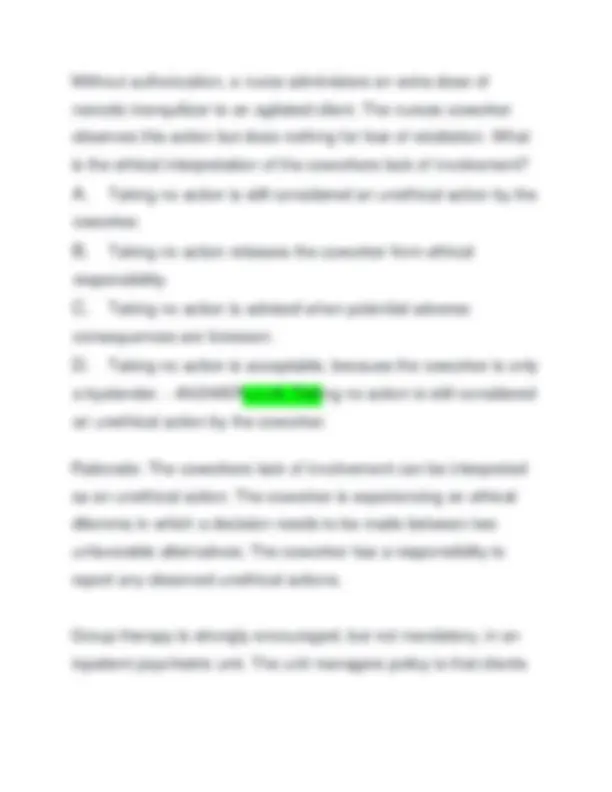
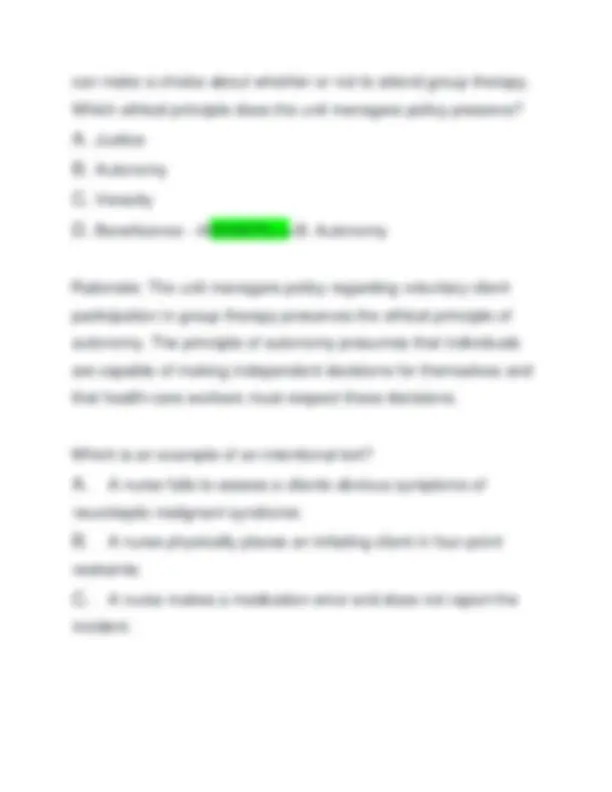
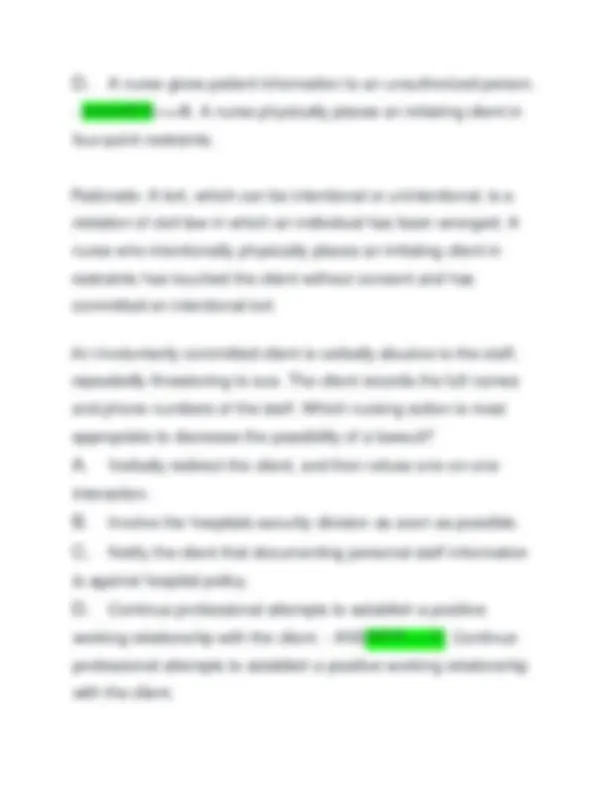
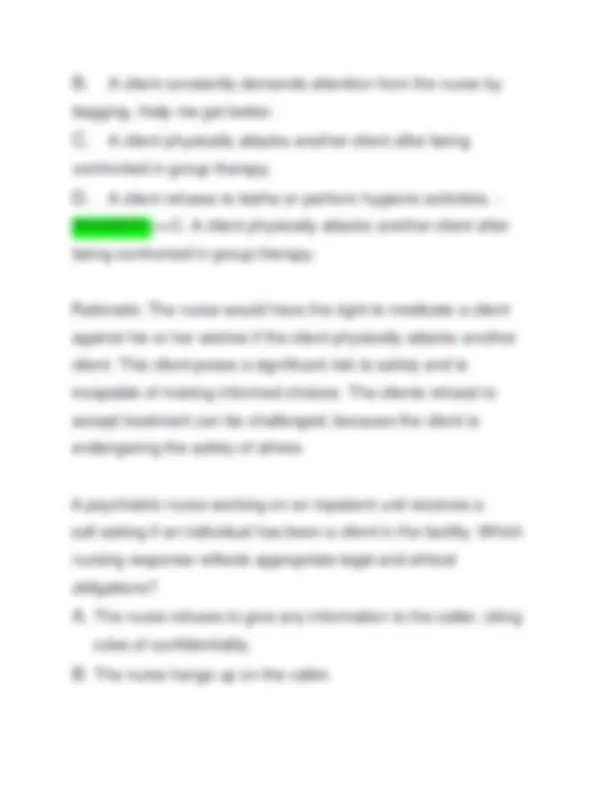
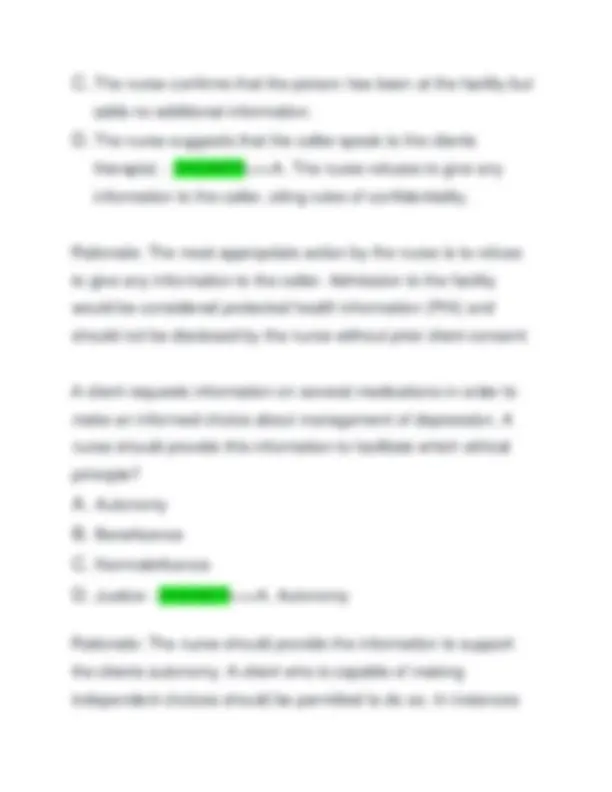
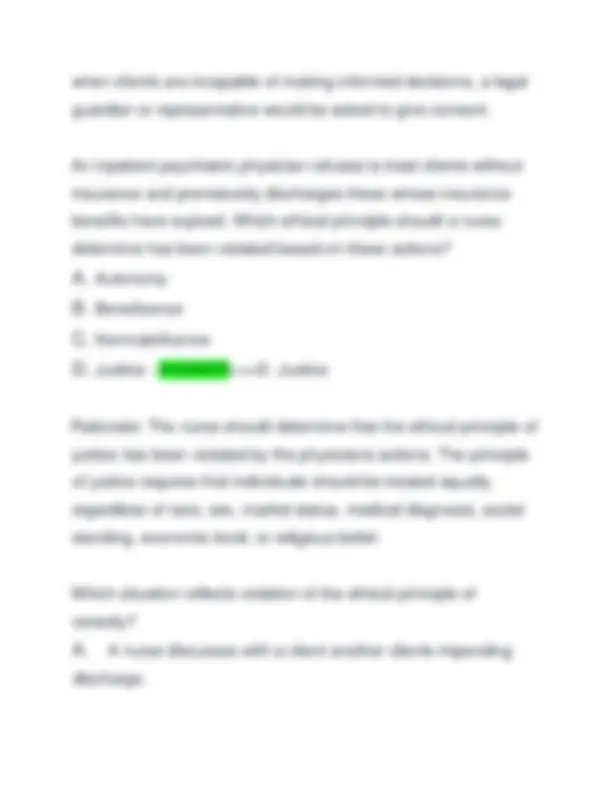
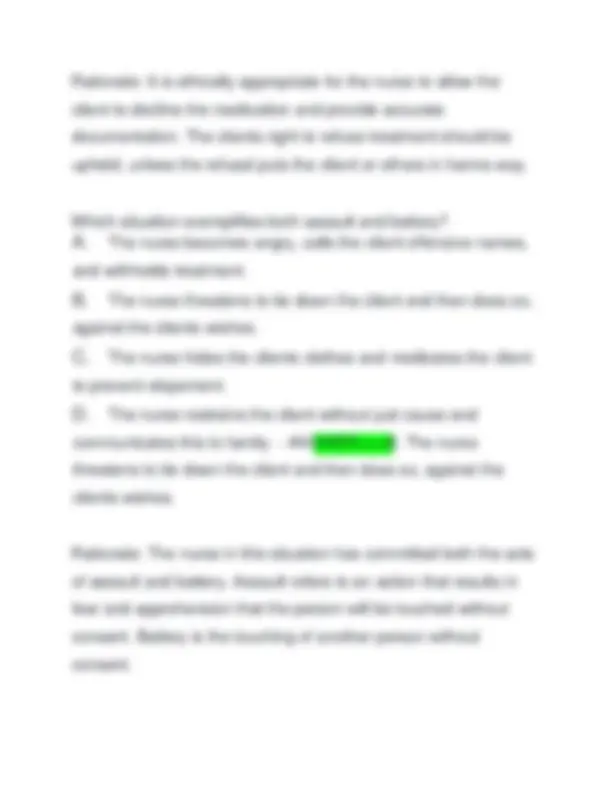
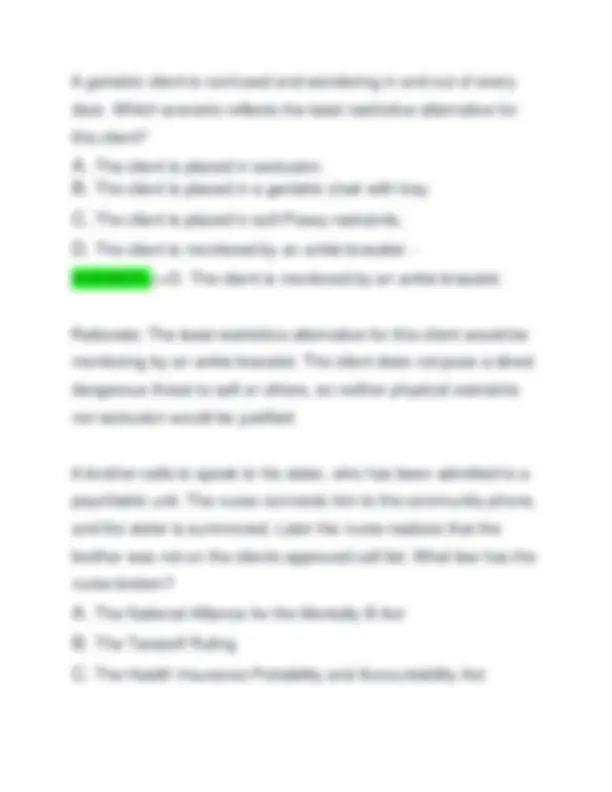
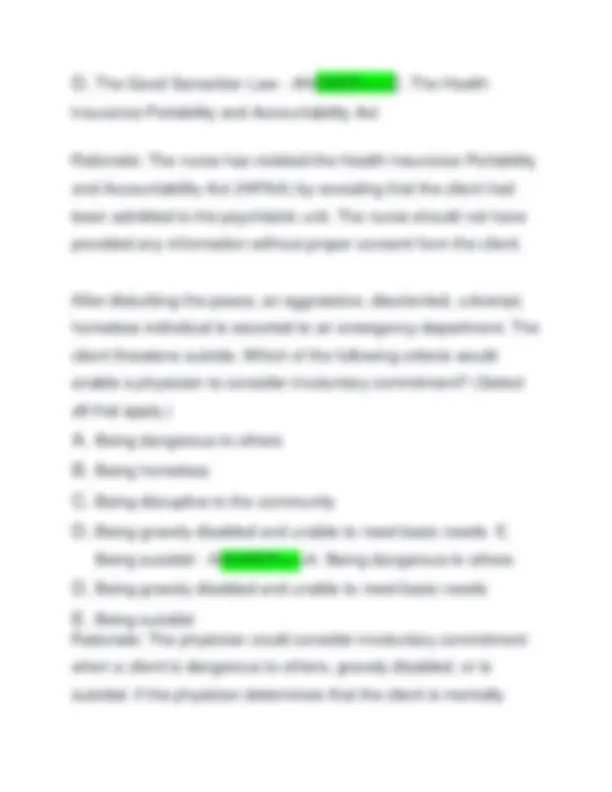
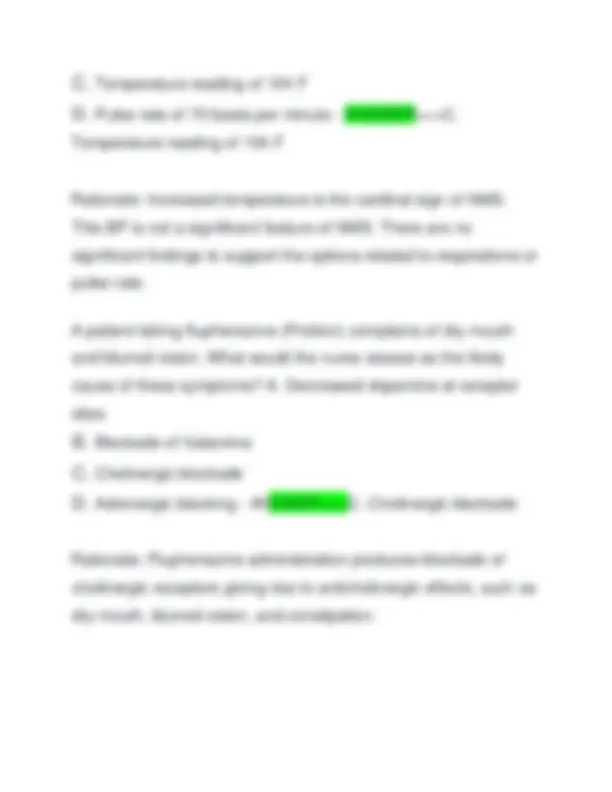
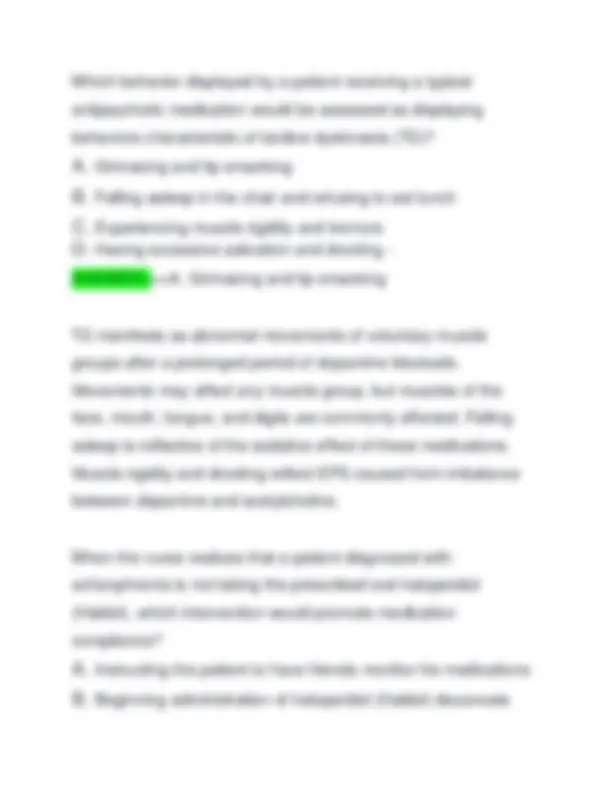
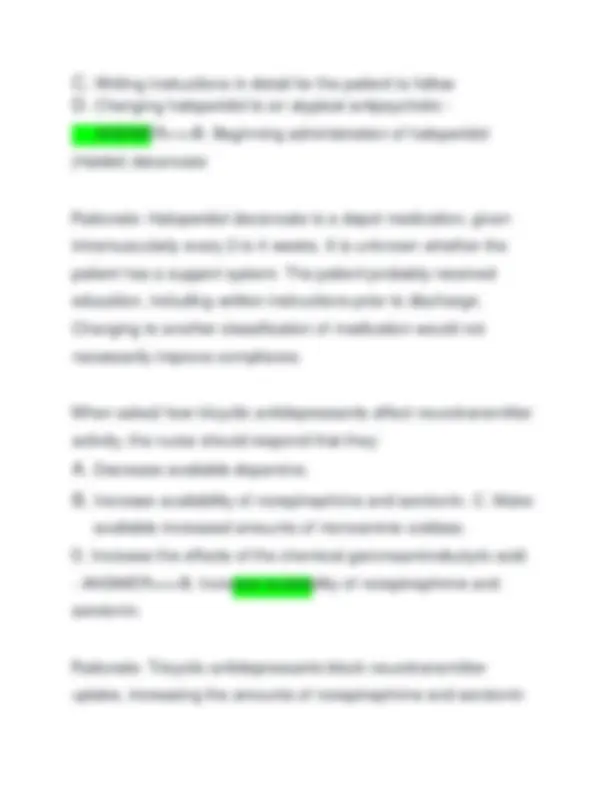
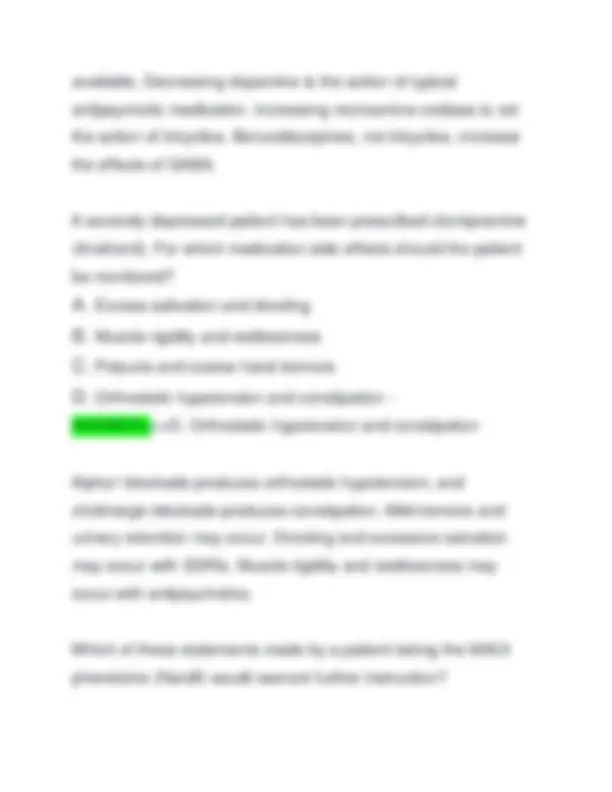
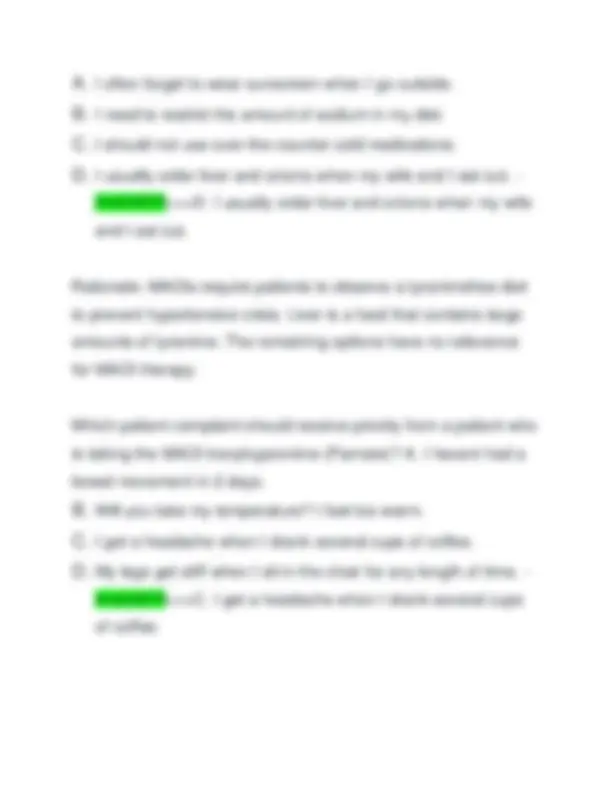
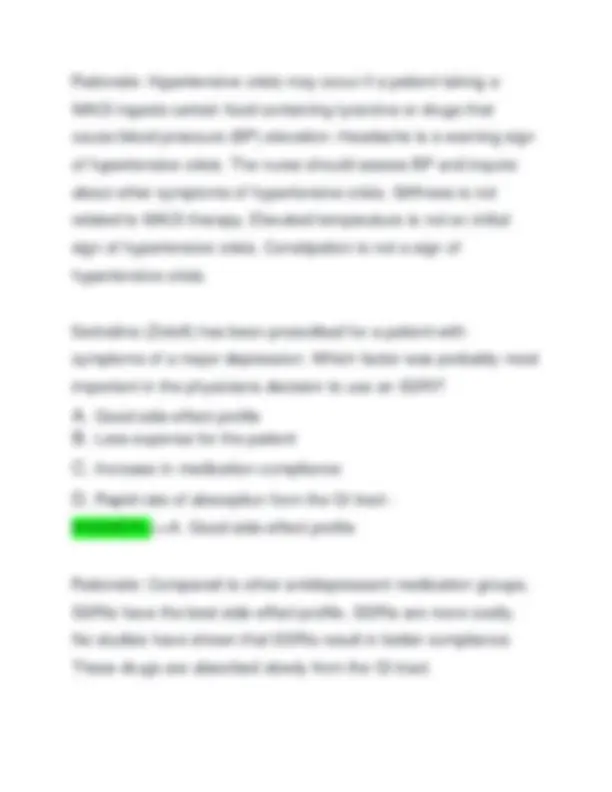
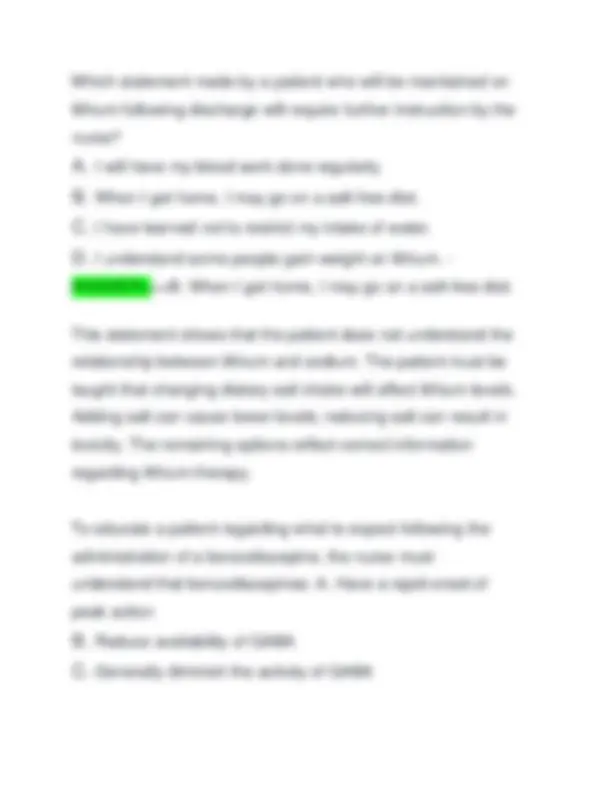
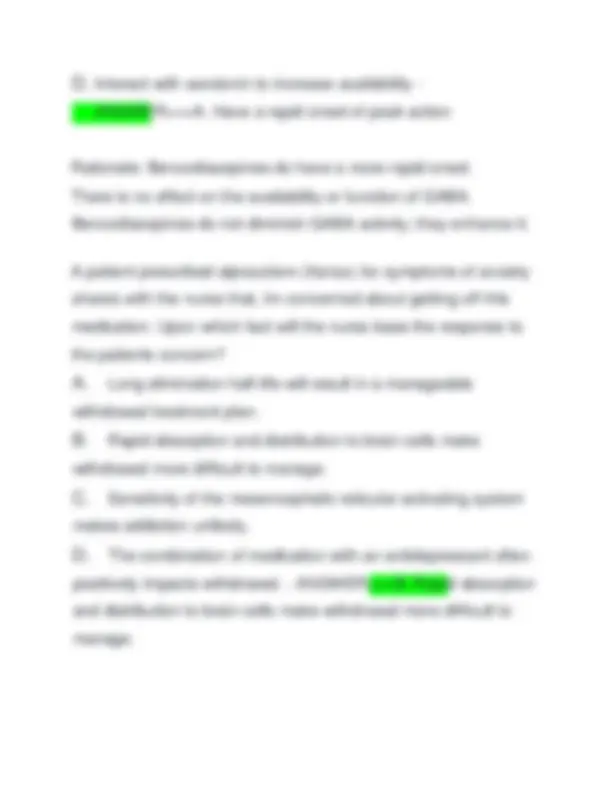
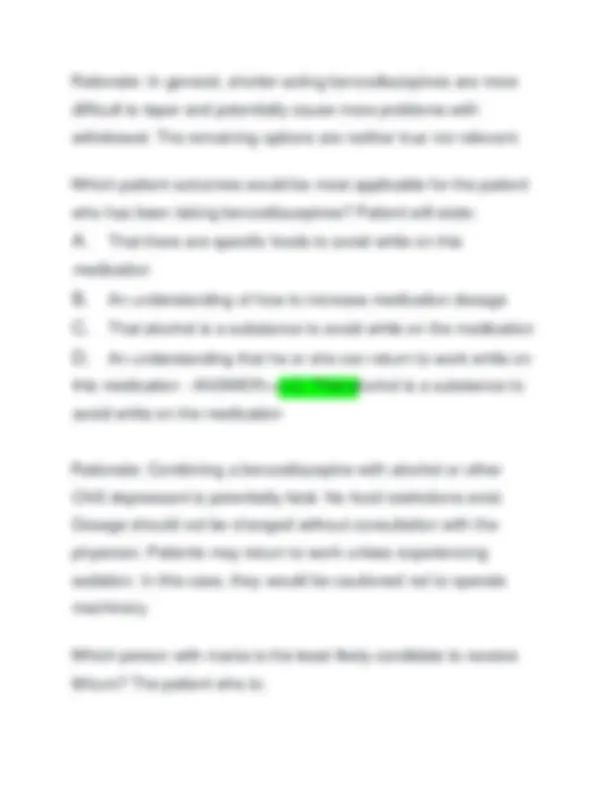
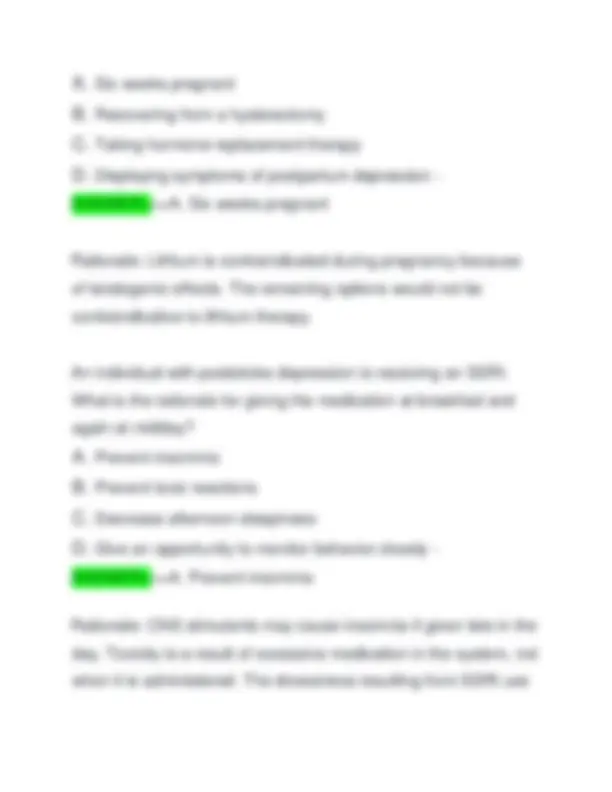
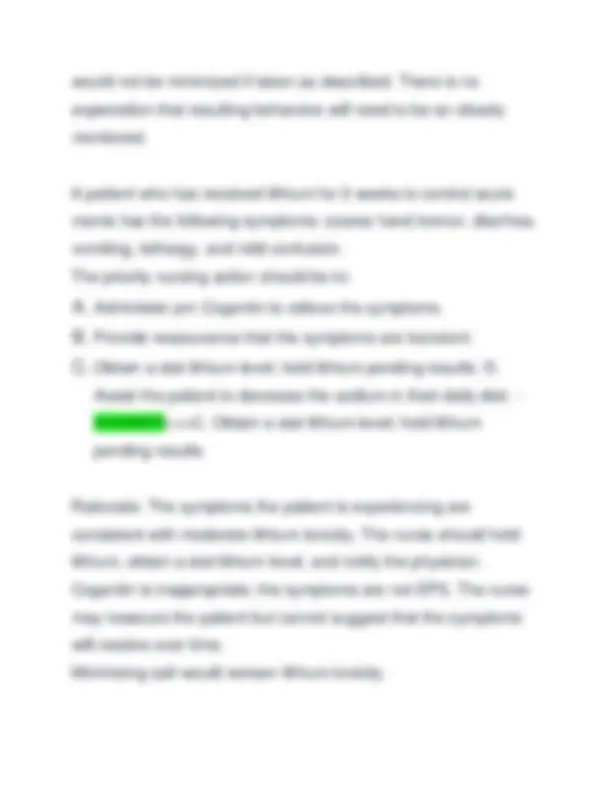
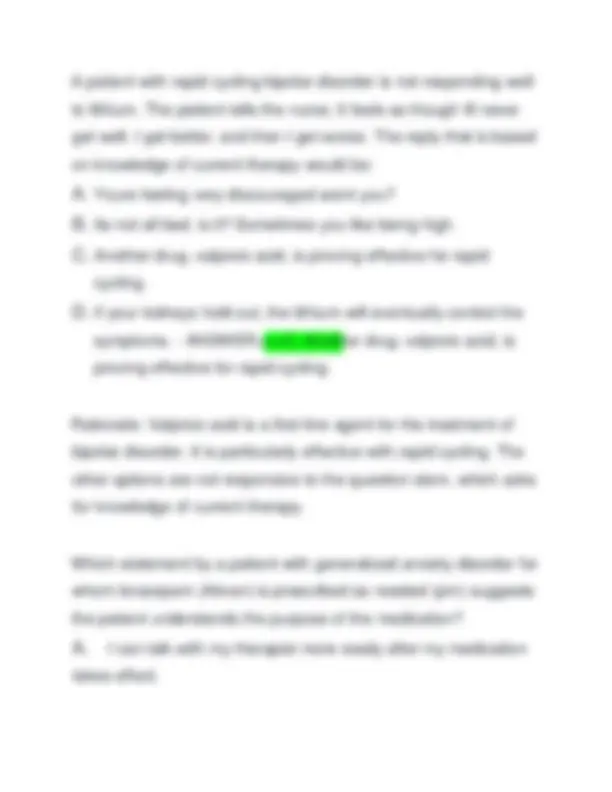
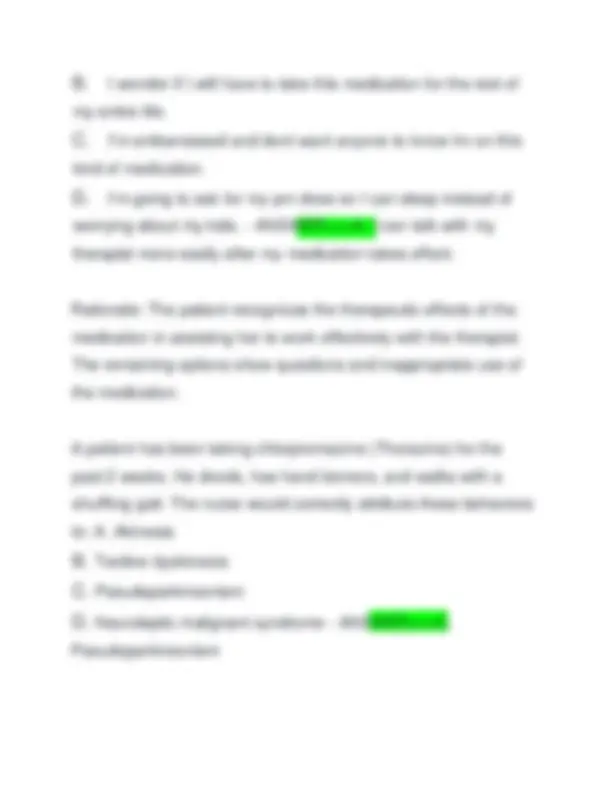
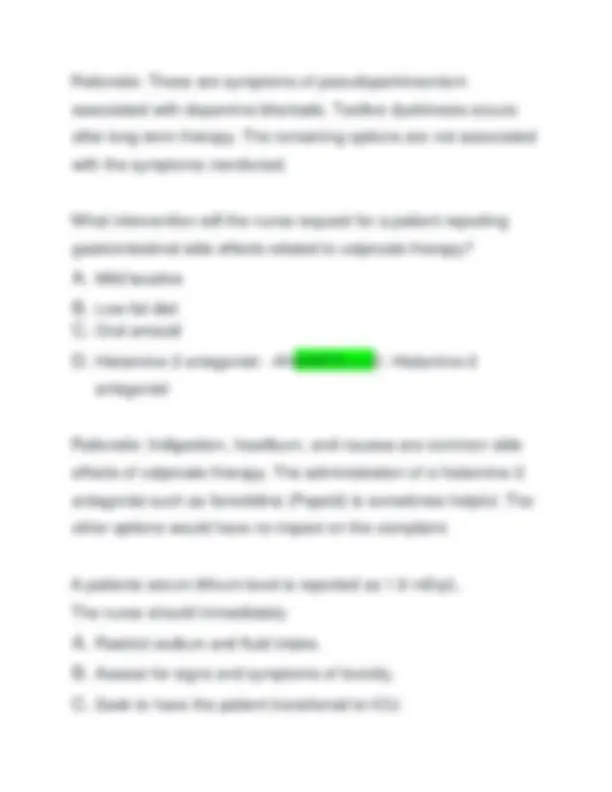
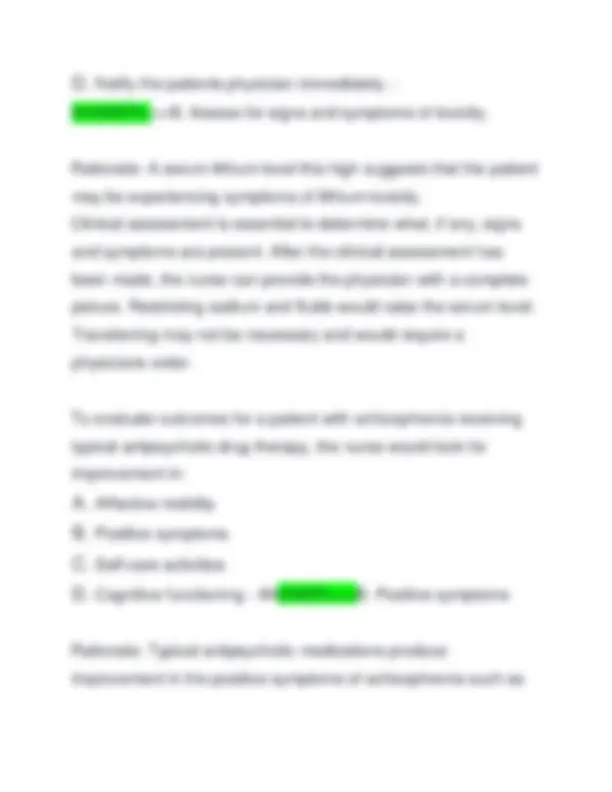
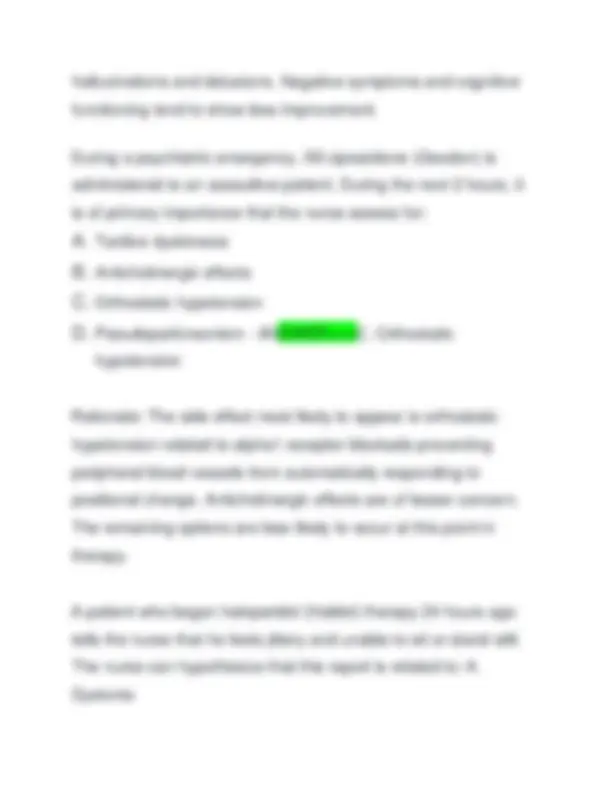
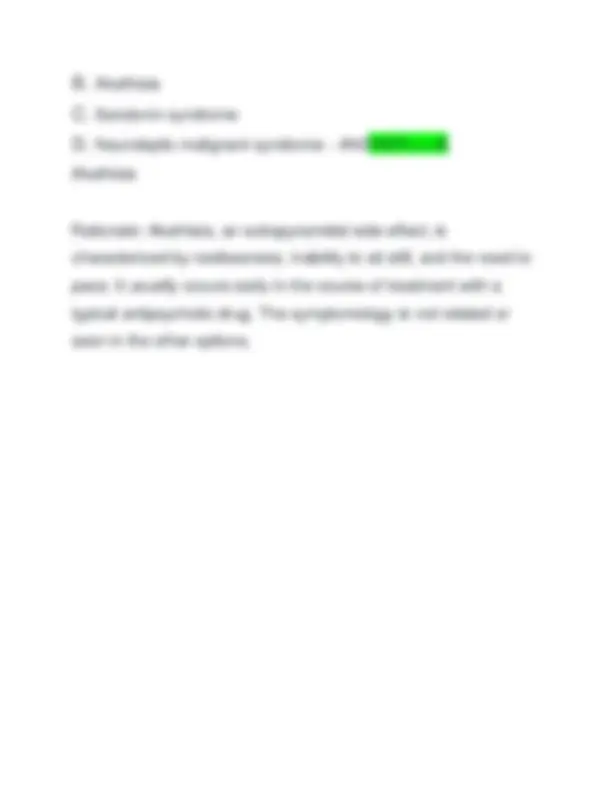


Study with the several resources on Docsity

Earn points by helping other students or get them with a premium plan


Prepare for your exams
Study with the several resources on Docsity

Earn points to download
Earn points by helping other students or get them with a premium plan
Community
Ask the community for help and clear up your study doubts
Discover the best universities in your country according to Docsity users
Free resources
Download our free guides on studying techniques, anxiety management strategies, and thesis advice from Docsity tutors
PSYCHIATRIC/MENTAL HEALTH NU (CHAPTERS 3 AND 4) EXAM QUESTIONS WITH COMPLETE SOLUTIONS GUARANTEED PASS BRAND NEW 2025
Typology: Exams
1 / 34

This page cannot be seen from the preview
Don't miss anything!



























In response to a student's question regarding choosing a psychiatric specialty, a charge nurse states, "Mentally ill clients need special care. If I were in that position, I'd want a caring nurse also." From which ethical framework is the charge nurse operating?
Rationale: The charge nurse is operating from a Christian ethics framework. The imperative demand of Christian ethics is that all decisions about right and wrong should be centered in love for God and in treating others with the same respect and dignity with which we would expect to be treated. Kantianism states that decisions should be made based on moral law and that actions
are bound by a sense of moral duty. Utilitarianism holds that decisions should be made focusing on the end result being happiness. Ethical egoism promotes the idea that what is right is good for the individual. During a hiring interview, which response by a nursing applicant should indicate that the applicant operates from an ethical egoism framework?
mentally ill.
for me.
med/surg kills my back.
thing to do. - ANSWER>>>B. This job will pay the bills, and the workload is light enough for me. Rationale: The applicants comment reflects the ethical egoism framework. This framework promotes the idea that decisions are made based on what is good for the individual and may not take the needs of others into account.
can make a choice about whether or not to attend group therapy. Which ethical principle does the unit managers policy preserve?
Rationale: The unit managers policy regarding voluntary client participation in group therapy preserves the ethical principle of autonomy. The principle of autonomy presumes that individuals are capable of making independent decisions for themselves and that health-care workers must respect these decisions. Which is an example of an intentional tort?
neuroleptic malignant syndrome.
restraints.
incident.
interaction.
is against hospital policy.
working relationship with the client. - ANSWER>>>D. Continue professional attempts to establish a positive working relationship with the client.
situation should be treated as an emergency, and treatment may be performed without informed consent. Which potential client should a nurse identify as a candidate for involuntarily commitment?
summer
ANSWER>>>B. The client threatening to commit suicide Rationale: The nurse should identify the client threatening to commit suicide as eligible for involuntary commitment. The suicidal client who refuses treatments is in danger and needs emergency treatment. A client diagnosed with schizophrenia refuses to take medication, citing the right of autonomy. Under which circumstance would a nurse have the right to medicate the client against the clients wishes?
member.
begging, Help me get better.
confronted in group therapy.
ANSWER>>>C. A client physically attacks another client after being confronted in group therapy. Rationale: The nurse would have the right to medicate a client against his or her wishes if the client physically attacks another client. This client poses a significant risk to safety and is incapable of making informed choices. The clients refusal to accept treatment can be challenged, because the client is endangering the safety of others. A psychiatric nurse working on an inpatient unit receives a call asking if an individual has been a client in the facility. Which nursing response reflects appropriate legal and ethical obligations?
rules of confidentiality.
when clients are incapable of making informed decisions, a legal guardian or representative would be asked to give consent. An inpatient psychiatric physician refuses to treat clients without insurance and prematurely discharges those whose insurance benefits have expired. Which ethical principle should a nurse determine has been violated based on these actions?
Rationale: The nurse should determine that the ethical principle of justice has been violated by the physicians actions. The principle of justice requires that individuals should be treated equally, regardless of race, sex, marital status, medical diagnosis, social standing, economic level, or religious belief. Which situation reflects violation of the ethical principle of veracity?
discharge.
responsible for the clients care.
carry linen to the seclusion room.
illness severity. - ANSWER>>>C. A nurse tricks a client into seclusion by asking the client to carry linen to the seclusion room. Rationale: The nurse who tricks a client into seclusion has violated the ethical principle of veracity. The principle of veracity refers to ones duty to always be truthful and not intentionally deceive or mislead clients. A client who will be receiving electroconvulsive therapy (ECT) must provide informed consent. Which situation should cause a nurse to question the validity of the informed consent?
and time of day.
Rationale: It is ethically appropriate for the nurse to allow the client to decline the medication and provide accurate documentation. The clients right to refuse treatment should be upheld, unless the refusal puts the client or others in harms way. Which situation exemplifies both assault and battery?
and withholds treatment.
against the clients wishes.
to prevent elopement.
communicates this to family. - ANSWER>>>B. The nurse threatens to tie down the client and then does so, against the clients wishes. Rationale: The nurse in this situation has committed both the acts of assault and battery. Assault refers to an action that results in fear and apprehension that the person will be touched without consent. Battery is the touching of another person without consent.
A geriatric client is confused and wandering in and out of every door. Which scenario reflects the least restrictive alternative for this client?
ANSWER>>>D. The client is monitored by an ankle bracelet. Rationale: The least-restrictive alternative for this client would be monitoring by an ankle bracelet. The client does not pose a direct dangerous threat to self or others, so neither physical restraints nor seclusion would be justified. A brother calls to speak to his sister, who has been admitted to a psychiatric unit. The nurse connects him to the community phone, and the sister is summoned. Later the nurse realizes that the brother was not on the clients approved call list. What law has the nurse broken?
incompetent, consent should be obtained from the legal guardian or court-approved guardian or conservator. A hospital administrator may give permission for involuntary commitment when time does not permit court intervention. A valid, legally recognized claim or entitlement, encompassing both freedom from government interference or discriminatory treatment and an entitlement to a benefit or a service is defined as a _______________________. - ANSWER>>>right Rationale: A right is a valid, legally recognized claim or entitlement, encompassing both freedom from government interference or discriminatory treatment and an entitlement to a benefit or a service. A right is absolute when there is no restriction whatsoever on the individuals entitlement. A branch of philosophy that addresses methods for determining the rightness or wrongness of ones actions is defined as _______________________. - ANSWER>>>ethics Rationale: Ethics is a branch of philosophy that deals with systematic approaches to distinguishing right from wrong
behavior. Bioethics is the term applied to these principles when they refer to concepts within the scope of medicine, nursing, and allied health. The nurse manager on the psychiatric unit was explaining to the new staff the differences between typical and atypical antipsychotics. The nurse correctly states that atypical antipsychotics: A. Remain in the system longer
Which behavior displayed by a patient receiving a typical antipsychotic medication would be assessed as displaying behaviors characteristic of tardive dyskinesia (TD)?
ANSWER>>>A. Grimacing and lip smacking TD manifests as abnormal movements of voluntary muscle groups after a prolonged period of dopamine blockade. Movements may affect any muscle group, but muscles of the face, mouth, tongue, and digits are commonly affected. Falling asleep is reflective of the sedative effect of these medications. Muscle rigidity and drooling reflect EPS caused from imbalance between dopamine and acetylcholine. When the nurse realizes that a patient diagnosed with schizophrenia is not taking the prescribed oral haloperidol (Haldol), which intervention would promote medication compliance?
ANSWER>>>B. Beginning administration of haloperidol (Haldol) decanoate Rationale: Haloperidol decanoate is a depot medication, given intramuscularly every 2 to 4 weeks. It is unknown whether the patient has a support system. The patient probably received education, including written instructions prior to discharge. Changing to another classification of medication would not necessarily improve compliance. When asked how tricyclic antidepressants affect neurotransmitter activity, the nurse should respond that they:
available increased amounts of monoamine oxidase. D. Increase the effects of the chemical gammaaminobutyric acid.